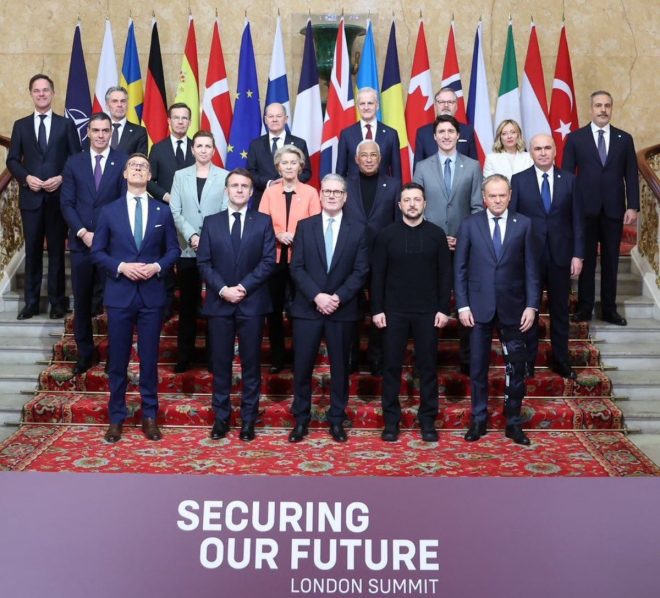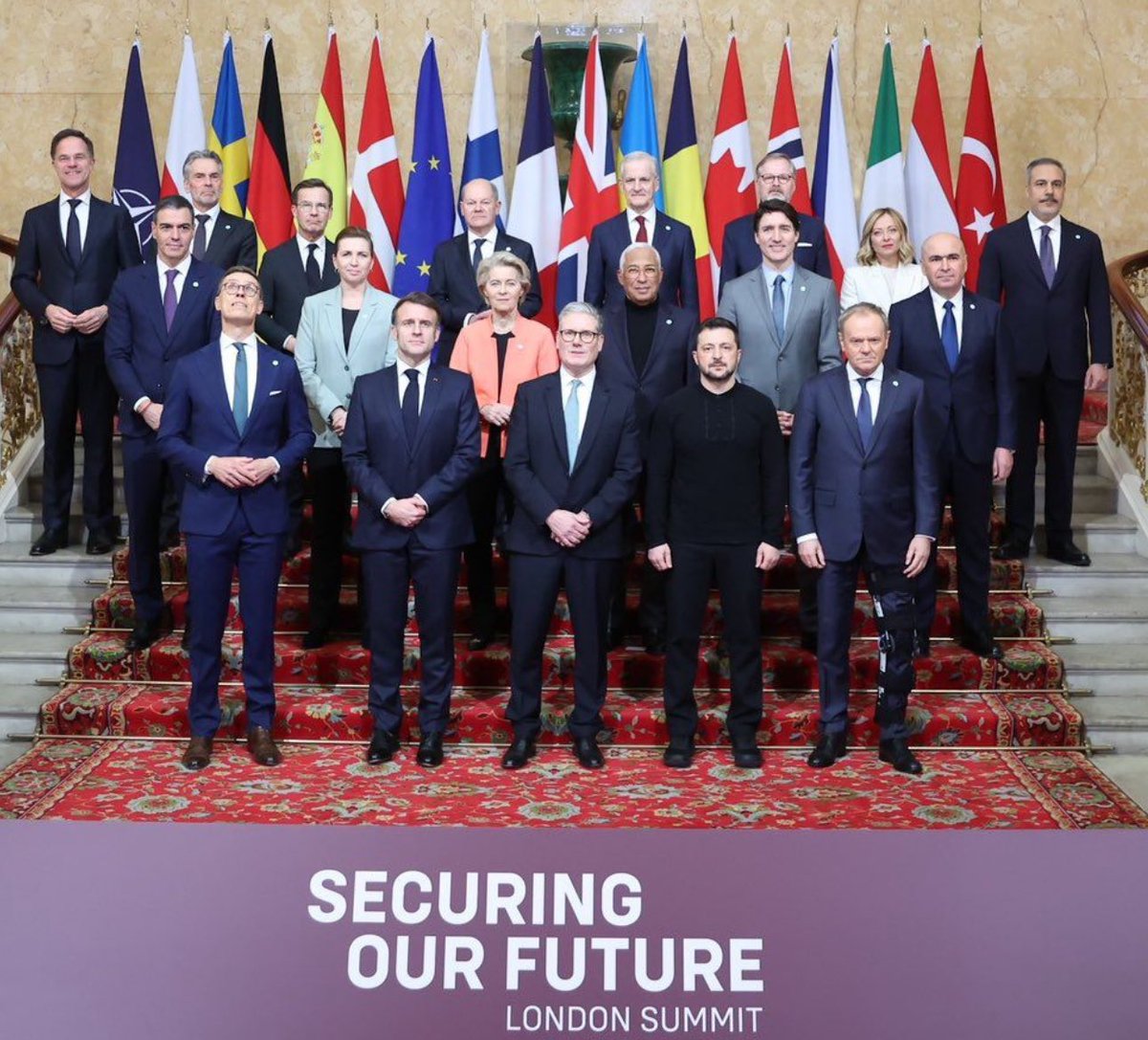
Emergency Summit in London: A Gathering of Global Leaders
On March 2, 2025, an emergency summit took place in London, bringing together an impressive assembly of political leaders from around the globe. The primary focus of this summit was to address the ongoing crisis in Ukraine, highlighting the urgent need for international support and collaboration in the face of geopolitical challenges. This significant event saw the participation of 13 Prime Ministers and 2 Presidents, underscoring the gravity of the situation and the commitment of these nations to work together for a solution.
Attendees of the Summit
The summit featured a diverse lineup of leaders, representing various countries and political ideologies. Notable attendees included:
- Keir Starmer (UK): The host of the summit, representing the United Kingdom and its commitment to supporting Ukraine.
- Volodymyr Zelensky (Ukraine): The President of Ukraine, emphasizing the need for international solidarity in the face of aggression.
- Emmanuel Macron (France): The French President, whose nation has been a staunch supporter of Ukraine throughout the conflict.
- Olaf Scholz (Germany): The German Chancellor, representing one of Europe’s largest economies and its critical role in European security.
- Giorgia Meloni (Italy): The Italian Prime Minister, who has been vocal about the need for a unified European response.
- Donald Tusk (Poland): The Polish leader, whose country has been significantly affected by the crisis in Ukraine and has taken a proactive stance in providing assistance.
- Justin Trudeau (Canada): The Canadian Prime Minister, representing North American support for Ukraine.
- Pedro Sánchez (Spain): The Spanish Prime Minister, advocating for a collective European response to the crisis.
- Mette Frederiksen (Denmark): The Danish Prime Minister, highlighting Nordic support for Ukraine.
- Jonas Gahr Støre (Norway): The Norwegian leader, emphasizing the importance of solidarity in times of crisis.
- Alexander Stubb (Finland): The Finnish Prime Minister, whose country shares a border with Russia and is keenly aware of the regional security landscape.
- Ulf Kristersson (Sweden): The Swedish Prime Minister, advocating for a strong European response to security threats.
- Wopke Hoekstra (Netherlands): The Dutch leader, emphasizing the need for a coordinated approach.
- Petr Fiala (Czech Republic): The Czech Prime Minister, representing Central European perspectives on the crisis.
- Nicolae Bolojan (Romania): The Romanian leader, whose country has been directly affected by regional security issues.
- Hakan Fidan (Turkey): The Turkish Foreign Minister, representing Turkey’s unique position as a NATO ally.
- Ursula von der Leyen (European Commission): The President of the European Commission, highlighting the European Union’s commitment to supporting Ukraine.
- António Costa (Portugal): The Portuguese Prime Minister, advocating for a unified European response to the crisis.
- Mark Rutte (NATO): The Prime Minister of the Netherlands and a representative of NATO, emphasizing the alliance’s role in collective security.
The Importance of the Summit
This emergency summit was crucial for several reasons. First and foremost, it served as a platform for leaders to discuss and strategize collective action in response to the ongoing conflict in Ukraine. The involvement of such a diverse group of leaders indicates a broad consensus on the need for a united front against aggression and instability in Europe.
Furthermore, the summit allowed for the sharing of perspectives and experiences from various countries, facilitating a deeper understanding of the crisis’s implications not just for Ukraine, but for global security and stability. The gathering also aimed to foster collaboration in humanitarian efforts, military support, and economic assistance for Ukraine, reinforcing the message that the international community stands firmly with the Ukrainian people.
- YOU MAY ALSO LIKE TO WATCH THIS TRENDING STORY ON YOUTUBE. Waverly Hills Hospital's Horror Story: The Most Haunted Room 502
Key Discussion Points
While the specific agenda of the summit was not publicly disclosed, several key issues likely dominated discussions:
- Military Support: The leaders likely deliberated on the provision of military aid to Ukraine, including advanced weaponry and training for Ukrainian forces.
- Humanitarian Assistance: A significant focus of the summit was expected to be the humanitarian crisis resulting from the conflict, with discussions on how to provide aid to displaced persons and those affected by the war.
- Economic Sanctions on Russia: The leaders probably discussed the effectiveness of existing sanctions on Russia and potential new measures to increase economic pressure on the Kremlin.
- Diplomatic Efforts: The summit may have included talks on diplomatic initiatives aimed at seeking a peaceful resolution to the conflict and re-establishing stability in the region.
- Long-term Security Framework: A crucial part of the discussions would have revolved around establishing a long-term security framework for Europe, ensuring that nations are better prepared to deal with future threats.
Conclusion
The emergency summit in London on March 2, 2025, marked a pivotal moment in the international response to the crisis in Ukraine. With a robust representation of global leaders, the event underscored the collective commitment to supporting Ukraine in its fight for sovereignty and security. As geopolitical dynamics continue to evolve, the actions and agreements reached during this summit will play a significant role in shaping the future of European security and the global order. The unity displayed at this gathering sends a strong message that the international community is prepared to stand together in the face of aggression, emphasizing the importance of collaboration and solidarity in addressing global challenges.

BREAKING:
13 PMs, 2 presidents attending today’s emergency summit in London:
Starmer
Zelensky
Macron
Scholz
Meloni
Tusk
Trudeau
Sánchez
Frederiksen
Støre
Stubb
Kristersson
Schoof
Fiala
Bolojan
Fidan
VdL
Costa
NATO’s Rutte pic.twitter.com/Q3nw14qOe7— Visegrád 24 (@visegrad24) March 2, 2025
BREAKING: 13 PMs, 2 Presidents Attending Today’s Emergency Summit in London
Today marks a significant moment in international relations as an emergency summit unfolds in London, bringing together a robust assembly of leaders from various nations. With the focus on urgent matters surrounding Ukraine, the summit features 13 Prime Ministers and 2 Presidents, showcasing a united front in addressing pressing global issues. This gathering is not just a routine meeting; it’s a critical point of discussion for the geopolitical landscape.
Starmer: The UK’s Role in Global Politics
As the host of the summit, UK Prime Minister Keir Starmer has a pivotal role in facilitating dialogue among the attending leaders. His stance on Ukraine has been clear, advocating for strong support and solidarity with the nation as it navigates through ongoing conflicts and challenges. Starmer’s leadership is critical, especially as the UK seeks to reaffirm its position on the global stage post-Brexit.
Zelensky: The Voice of Ukraine
Ukrainian President Volodymyr Zelensky is undoubtedly one of the most crucial figures at this summit. His presence symbolizes the resilience and determination of the Ukrainian people. Zelensky has consistently called for international support, and his participation today is a testament to Ukraine’s ongoing struggle and the need for global solidarity. The discussions are expected to focus on military aid, humanitarian support, and strategies for peace.
Macron: France’s Diplomatic Influence
French President Emmanuel Macron has been a vocal advocate for diplomatic solutions in the Ukraine crisis. His approach balances military assistance with calls for dialogue, indicating a nuanced understanding of the conflict’s complexities. Macron’s insights during the summit will be vital as leaders discuss the best paths forward.
Scholz: Germany’s Commitment to Stability
German Chancellor Olaf Scholz is another key player in this high-stakes assembly. Germany has been instrumental in providing support to Ukraine, and Scholz’s presence signifies continued commitment to peace in Europe. His discussions are likely to revolve around military support and ensuring that humanitarian needs are met.
Meloni: Italy’s Role in the Coalition
Italian Prime Minister Giorgia Meloni adds another layer of influence to the summit. Italy has played a supportive role in the coalition backing Ukraine, and Meloni’s insights will be essential in aligning European strategies. Her participation underscores Italy’s dedication to a united European response.
Tusk: Representing Poland’s Perspective
Former European Council President Donald Tusk, now the Polish Prime Minister, brings a unique perspective to the summit. Poland has been a frontline state in the Ukrainian crisis, welcoming refugees and providing military aid. Tusk’s discussions will likely focus on regional security and the humanitarian crisis resulting from the conflict.
Trudeau: Canada’s Support for Ukraine
Canadian Prime Minister Justin Trudeau has been a staunch ally of Ukraine, offering military and humanitarian assistance. His presence at the summit reinforces Canada’s commitment to supporting democracy and fighting against aggression. Trudeau’s contributions will stress the importance of international cooperation.
Sánchez: Spain’s Commitment to Europe
Spanish Prime Minister Pedro Sánchez is also in attendance, highlighting Spain’s role in Europe’s response to the Ukraine crisis. His discussions will likely touch on the need for solidarity among European nations to withstand external pressures and promote peace within the continent.
Frederiksen: Denmark’s Strategic Interests
Denmark’s Prime Minister Mette Frederiksen adds another dimension to the coalition. Denmark has been active in providing military support to Ukraine, and Frederiksen’s insights will focus on the importance of continued support and intervention strategies.
Støre: Norway’s Humanitarian Focus
Norwegian Prime Minister Jonas Gahr Støre is known for his humanitarian approach. Norway has been active in providing aid, and Støre’s discussions will likely revolve around humanitarian needs and support for ongoing peace initiatives.
Stubb: Finland’s Strategic Engagement
Finnish Prime Minister Alexander Stubb is representing Finland’s strategic position. Finland has a unique history with Russia, making its insights particularly valuable. Stubb’s participation underscores the importance of understanding regional dynamics in the discussions.
Kristersson: Sweden’s Commitment to Peace
Swedish Prime Minister Ulf Kristersson will also lend his voice to the summit, emphasizing Sweden’s commitment to peace and stability in Europe. His contributions will focus on collaborative efforts among European nations to address the ongoing crisis.
Schoof: The Netherlands’ Strategic Alliances
Dutch Prime Minister Mark Rutte is representing the Netherlands, bringing a focus on strategic alliances in Europe. The Netherlands has been a supporter of Ukraine, and Rutte’s discussions will likely emphasize the importance of collective action.
Fiala: Czech Republic’s Support for Ukraine
Czech Prime Minister Petr Fiala will discuss the Czech Republic’s ongoing support for Ukraine. His presence highlights the solidarity among Central European nations in addressing the challenges posed by the conflict.
Bolojan: Romania’s Regional Interests
Romanian Prime Minister Nicolae Bolojan brings attention to regional security issues. Romania shares a border with Ukraine and has been significantly impacted by the conflict, making Bolojan’s insights crucial for discussions around regional stability.
Fidan: Turkey’s Strategic Position
Turkish Foreign Minister Hakan Fidan adds an essential perspective, given Turkey’s unique role in NATO and its relations with both Ukraine and Russia. His contributions will focus on balancing diplomacy and defense in the ongoing crisis.
VdL: EU’s Comprehensive Strategy
European Commission President Ursula von der Leyen will address the EU’s comprehensive strategy regarding Ukraine. The EU’s collective efforts are vital for long-term solutions, and von der Leyen’s insights will be instrumental in shaping the discussions.
Costa: Portugal’s Diplomatic Outreach
Portuguese Prime Minister António Costa is expected to contribute with Portugal’s perspective on the need for cooperation among European nations. His participation underscores the importance of solidarity in facing the challenges posed by the conflict.
NATO’s Rutte: Strengthening Alliances
NATO Secretary-General Jens Stoltenberg will also be present, emphasizing the alliance’s support for Ukraine. His presence reinforces NATO’s commitment to collective defense and partnership, ensuring that member states stand united in the face of aggression.
The emergency summit in London represents a crucial moment for diplomacy and international cooperation. With leaders from various nations coming together, the discussions will likely shape the future of Ukraine and the broader European landscape. As the world watches, the outcomes of this summit could pave the way for significant changes in international relations.
